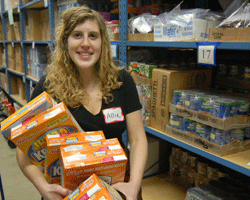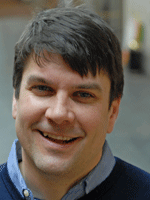You reached this page through the archive. Click here to return to the archive.
Note: This article is over a year old and information contained in it may no longer be accurate. Please use the contact information in the lower-left corner to verify any information in this article.
From classroom to community
February 5, 2010
Studying for tests and writing papers are no longer the only ways for some St. Olaf students to earn their grades. They’re also visiting residents at the Northfield Retirement Center, teaching local elementary school students how to reduce their waste, and serving meals at the Community Action Center.
 |
| Alexandra Mastny '11 was one of 35 students in the Christianity and Social Power class that got students involved in a variety of community service activities as part of their classwork. She helped make sure clients at the Northfield Food Shelf got the staples they needed. |
These are just several of the ways the Civic Engagement Program pairs students and community members. Since fall 2008, St. Olaf has offered about eight civic engagement classes per semester, each designed to promote academically relevant activities that serve the needs of the community.
The projects the students undertake vary as widely as the academic departments in which they are offered. Last spring an environmental studies class examined the Cannon River as a case study while an ethnographic research methods class teamed up with Tackling Obstacles and Raising College Hopes (TORCH), a Northfield-based graduation initiative.
Visiting Assistant Professor of Religion Peder Jothen ’94 currently is leading the civic engagement class Christianity and Social Power that explores the connection between Christian beliefs and broader issues such as social action, the environment, and politics.
During Interim (when students take one class during January, between semesters), students were required to contribute eight to ten hours of community service in one of several activities. They had the choice of volunteering at the Community Action Center in Northfield, working with Lutheran World Relief on an advocacy campaign to increase humanitarian aid to Colombia, or participating in a homeless immersion experience in Minneapolis.
“As a student,” says Alexandra Mastny ’11, one of 35 in the class, “it’s so much easier to understand and connect with the academic material if you have a personal experience relating to it. I have a greater appreciation for class readings, discussion, and lectures since I feel personally, currently applied to the issue of social justice.”
 |
| Peder Jothen '94 |
At the end of the course students wrote a critical reflection essay on their experiences. “It’s different from a regular book course,” says Jothen, “but it’s also challenging in a lot of ways.”
Students who took the civic engagement class Inclusive Practice: Individuals and Families in the fall also faced new experiences as they pursued a crucial component of social work: forming in-depth relationships with elderly people. And as part of another course, Eco-logic: Consumption and its Consequences, a group of Oles spent an afternoon at St. Dominic Elementary School discussing ways students and staff members can become more environmentally friendly.
Jothen believes the civic engagement component contributes important learning experiences to his religion class and reflects the values of St. Olaf. “Part of St. Olaf’s mission is to connect students to wider social issues,” he says, “and to build character in the sense of ‘how my life matters to the world.’”
This story first appeared in the college's Posten newsletter mailed to Northfield-area residents. To learn more about the Civic Engagement Program contact Associate Director for Civic Engagement Nate Jacobi: 786-3109, jacobi@stolaf.edu.
